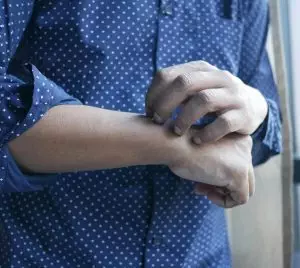By Xiaomei Cai, L.Ac., Ph.D. and Qineng Tan, L.Ac., Ph.D.

Shortness of breath, dyspnea? SIBO or fungal infections? Sensitive to smells? Signs of orthostatic low blood pressure? Itchy skin rash or hives? Musculoskeletal pain, joint pain? These can be some of the many different MCAS symptoms. Acupuncture and TCM can offer alternative treatment for MCAS, or mast cell activation disorders.
Mast Cell Activation Syndrome (MCAS) is a complex and often underdiagnosed condition characterized by the inappropriate activation of mast cells, which are immune cells involved in allergic and inflammatory responses throughout the body.
In short, mast cells are what cause people to have an allergic reaction to something. When mast cells encounter an allergen (or sometimes a medication, infection, or insect venom), antibodies inside them surface and send out “mediators.” Mast cells can produce hundreds of different types of mediators. These include histamine, leukotrienes and cytokines.
In MCAS, mast cells release excessive amounts of mediators, leading to a wide range of symptoms affecting various organ systems throughout the body. There are so many different mediators that science is not yet able to pinpoint which mediators may be causing which symptoms, in many cases.
This systemic activation of mast cells can occur spontaneously or in response to triggers such as stress, exercise, medications, infections, or environmental factors.
The symptoms of MCAS can vary widely among individuals and may mimic those of other conditions, making diagnosis challenging. There are five categories of MCAS symptom, affecting different parts or systems of the body:

Skin-related MCAS Symptoms:
Itching (pruritus)
Hives (urticaria)
Flushing or redness of the skin
Rashes or eczema-like lesions
Swelling (angioedema), particularly of the face, lips, tongue, or throat
Gastrointestinal MCAS Symptoms:
Abdominal pain or cramping
Nausea and vomiting
Diarrhea or constipation
Acid reflux or heartburn
Bloating or abdominal distension
Respiratory MCAS Symptoms:
Wheezing or difficulty breathing (dyspnea)
Chest tightness or pain
Coughing or throat clearing
Nasal congestion or runny nose
Sneezing or postnasal drip
Cardiovascular MCAS symptoms:
Rapid or irregular heartbeat (palpitations)
Low blood pressure (hypotension)
Fainting or near-fainting episodes (syncope)
Fluctuations in blood pressure upon standing (orthostatic hypotension)
Raynaud’s phenomenon (abnormal blood vessel spasm in response to cold or stress)
Neurological MCAS symptoms:
Headaches or migraines
Dizziness or lightheadedness
Cognitive dysfunction or brain fog
Anxiety or panic attacks
Fatigue or malaise
These symptoms can vary in severity and may occur intermittently or chronically.
What Causes MCAS?
Medical science is unclear about the underlying cause of MCAS. Mastocytosis is a different mast cell disorder, in which people have an elevated number of mast cells. However, with MCAS, people have a normal number of mast cells; they just behave in an exaggerated manner when triggered.
MCAS is “primary” when there is a particular genetic mutation, which may happen due to mastocytosis or monoclonal mast cell activation syndrome (MMAS,) in which there is a clonal line of mast cells.
In some cases, when a person also has a diagnosed autoimmune disorder, allergy, or infection the MCAS is considered “secondary,” meaning that the overactive mast cell activity may be stemming from that other primary condition.
A diagnosis of “Idiopathic MCAS” indicates that neither of the above factors is present.
MCAS can begin at any point in a person’s life, including during childhood.
MCAS Treatment

Treatment for Mast Cell Activation Syndrome (MCAS) in Western medicine typically involves a combination of medications and lifestyle modifications aimed at stabilizing mast cells and alleviating symptoms.
Antihistamines, such as H1 receptor blockers (e.g., loratadine, cetirizine) and H2 receptor blockers (e.g., famotidine, ranitidine), are commonly prescribed to reduce the effects of histamine released by mast cells.
Mast cell stabilizers, such as cromolyn sodium, can help prevent the release of inflammatory mediators from mast cells and may be used as preventive therapy. In cases of severe or refractory symptoms, corticosteroids or leukotriene inhibitors may be prescribed to suppress the immune response and reduce inflammation.
Medications to manage specific symptoms, such as gastrointestinal distress or cardiovascular symptoms, may be recommended.
Lifestyle modifications, such as avoiding known triggers, managing stress, and following a healthy diet, may also play a crucial role in managing MCAS symptoms.
It’s important for individuals with MCAS to work closely with their healthcare providers to develop a personalized treatment plan. Acupuncture and TCM can provide adjunct treatment for MCAS that address each patient’s unique symptoms and needs.
Can Acupuncture Help MCAS?
One of the central concepts of Traditional Chinese Medicine, which dates back many centuries, is that of the meridian system. The 12 meridians are channels of energy, or Qi, that flow throughout the body. Along the meridians are many acupoints: spots where Qi is activated when thin acupuncture needles or acupressure are applied to them.
But do the meridians exist as physical entities, or are they metaphorical?
Scientific research in the twentieth century sought to explain the various phenomena produced by the activation and manipulation of acupoints. It was found that both blood vessels and nerves are located near the acupoints in greater concentration than in other areas of the body. These studies suggested that acupuncture treatment functions through the vascular and nervous systems.
Later, further studies showed that acupuncture has effects on the production and releasing of hormones, such as endorphins, which has a analgesic effect of reducing pain.
The sensations that people feel as a result of acupuncture treatment cannot be fully explained by saying they are related to blood vessels, nerves, or hormones. Further questioning continued, asking if other cells or tissues could also be involved in how acupuncture works.
One female scientist, researcher, and professor in China, Jimei Song, hypothesized that activity around acupoints may be related to mast cell activation. This idea was Song’s Mast Cell Theory of Acupuncture (now called Song’s MC Theory for short, originally published in the Liaoning Journal of Traditional Chinese Medicine (TCM) in 1977.

Studies suggest that when an acupuncture needle penetrates the skin, mast cells are released, which then in turn, affect the blood vessels and nerves, leading to both sensations experienced by the patient in the moments, and systemic effects on the release of histamines, serotonin, and other chemicals than go on to create systemic effects. This is now considered a milestone in TCM research.
Acupuncture has been shown to have a positive effect on histamine response. Specific Chinese herbal formulas have also been shown to be effective in dampening mast cell activation. Compounds found in some herbs can help inhibit the production of cytokines.
An acupuncturist is able to address the problem both at its root, and help take care of the wide variety of symptoms a person may be experiencing. Acupuncture treatment can help relieve problems like itchy skin rash, sensitivities, orthostatic low blood pressure, and joint pain, all in one treatment session. A personalized herb formula can be prescribed to suit each individual patient.
Acupuncture Near Me for MCAS in Los Angeles
MCAS can mimic many other conditions and be difficult to diagnose and treat. This is what makes acupuncture, herbs, and moxibustion excellent modalities for helping to relieve MCAS symptoms such as: dizziness, headaches, musculoskeletal pain, insomnia, anxiety, hives, GERD, SIBO, IBS, interstitial cystitis bladder pressure, and more. Acupuncture and TCM can offer an adjunct or alternative treatment for MCAS symptoms.
*This article is for education from the perspective of Traditional Chinese Medicine only. The education provided by this article is not approved by FDA to diagnose, prevent, treat and cure human diseases. It should not stop you from consulting with your physician for your medical conditions. Traditional Chinese Medicine is based on Qi, which is an invisible force that usually cannot be observed by modern science. Because science focuses on testing ideas about the natural world with evidence obtained through observation, these aspects of acupuncture can’t be studied by science. Therefore acupuncture and Chinese herbs are often not supported by double-blind, randomized trials, and they are considered alternative medicine therapies in the United States.
